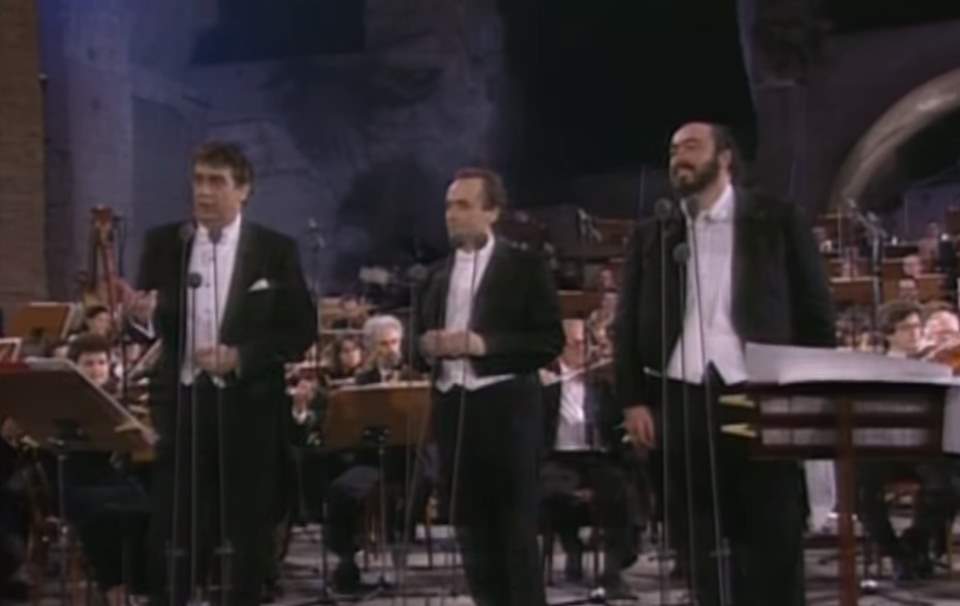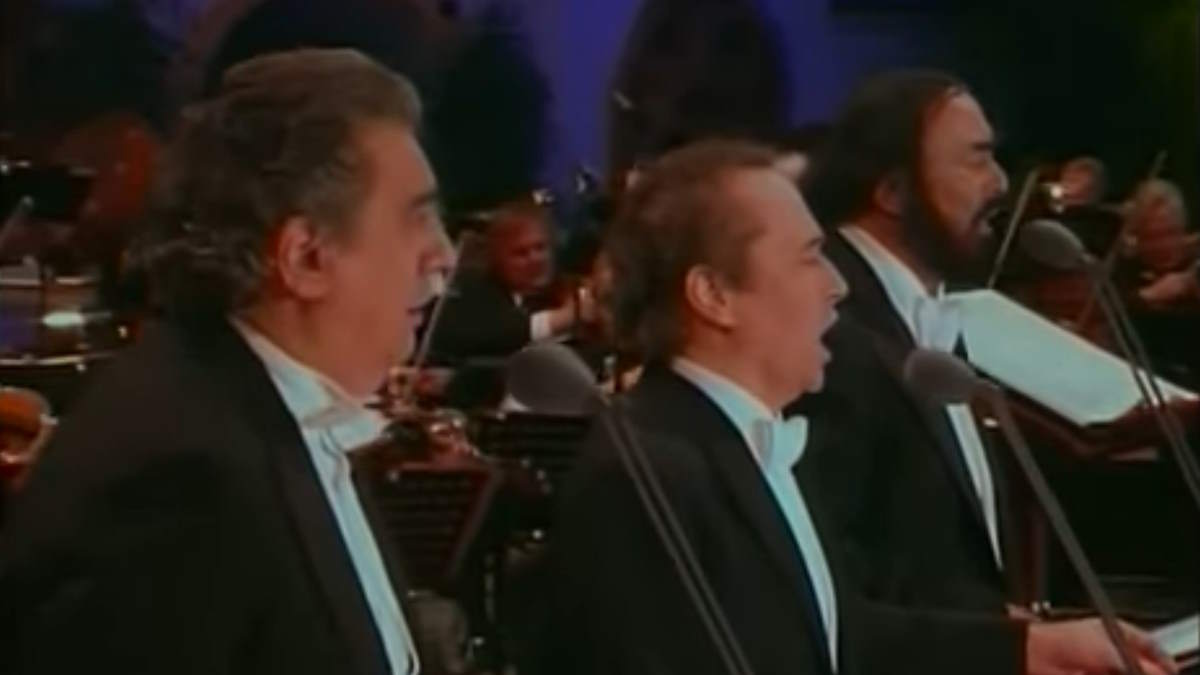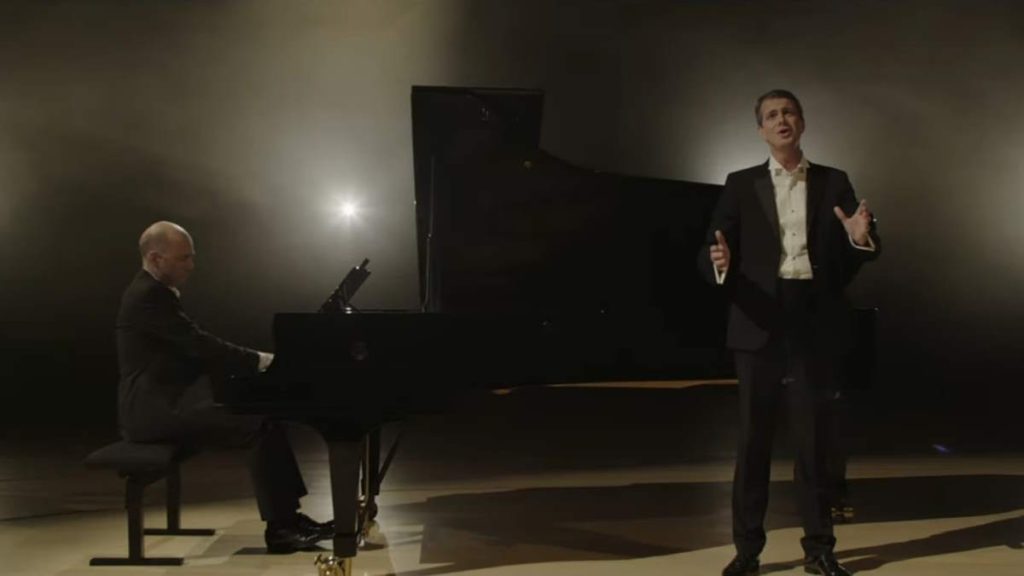The most celebrated operatic singing trio of the late 1990s and early 2000s, the Three Tenors (Luciano Pavarotti, José Carreras, and Plácido Domingo) sing Franz Schubert’s Ständchen (Serenade), a beautiful love song for originally voice and piano. Orchestre de Paris conducted by James Levine.
Franz Schubert’s Ständchen (Serenade)
Ständchen (Serenade) is the fourth song of Schwanengesang (Swan Song), D 957, a collection of 14 songs written by Franz Schubert at the end of his life.
The song is based on a poem by the German poet and music critic Ludwig Rellstab (1799-1860), which describes a person standing outside their lover’s window, singing a serenade to them. Schubert’s music perfectly captures the romantic and yearning mood of the poem. The melody is flowing and gentle, with a wistful quality that is both melancholic and beautiful.
“Ständchen” is one of Schubert’s most popular lieder and is often performed in recitals and concerts. Its popularity can be attributed to its timeless melody and the enduring theme of unrequited love. The song has been arranged for various instruments, including piano, violin, and guitar.
Schubert: Ständchen (Serenade) Lyrics
German: Ständchen
Leise flehen meine Lieder
Durch die Nacht zu dir;
In den stillen Hain hernieder,
Liebchen, komm zu mir!
Flüsternd schlanke Wipfel
rauschen
In des Mondes Licht;
Des Verräters feindlich Lauschen
Fürchte, Holde, nicht.
Hörst die Nachtigallen schlagen?
Ach! sie flehen dich,
Mit der Töne süßen Klagen
Flehen sie für mich.
Sie verstehn des Busens Sehnen,
Kennen Liebesschmerz,
Rühren mit den Silbertönen
Jedes weiche Herz.
Laß auch dir die Brust bewegen,
Liebchen, höre mich!
Bebend harr’ ich dir entgegen!
Komm, beglücke mich!
English: Serenade
My songs beckon softly
through the night to you;
below in the quiet grove,
Come to me, beloved!
The rustle of slender leaf tips
whispers
in the moonlight;
Do not fear the evil spying
of the betrayer, my dear.
Do you hear the nightingales’ call?
Ah, they beckon to you,
With the sweet sound of their
singing
they beckon to you for me.
They understand the heart’s
longing,
know the pain of love,
They calm each tender heart
with their silver tones.
Let them also stir within your
breast,
beloved, hear me!
Trembling I wait for you,
Come, please me!
The Three Tenors
The Three Tenors is a term used to refer to a trio of world-renowned opera singers who captivated audiences with their exceptional vocal talents. The trio consisted of Luciano Pavarotti, Plácido Domingo, and José Carreras. Together, they created a musical phenomenon and brought opera to a wider audience through their collaborative performances.
Luciano Pavarotti possessed a powerful and emotive voice that made him one of the most acclaimed opera singers of all time. His incredible vocal range and expressive performances garnered him worldwide recognition and adoration. Pavarotti’s renditions of iconic arias, such as “Nessun Dorma” from Puccini’s “Turandot,” became legendary.
Plácido Domingo is hailed for his versatility and longevity in the opera world. With his rich and resonant voice, Domingo commanded the stage in a wide range of roles, from the romantic heroes of Verdi and Puccini to the dramatic characters of Wagner. He is known for his impeccable vocal technique and his ability to convey deep emotion through his singing.
José Carreras possessed a warm and lyrical voice that captivated audiences. Carreras displayed remarkable musicality and sensitivity in his performances. Despite facing a battle with leukemia, he triumphantly returned to the stage and continued to enchant audiences with his artistry.
The Three Tenors came together for the first time in 1990, and first performed in a concert for the 1990 FIFA World Cup. Zubin Mehta conducted the orchestra of Maggio Musicale Fiorentino and the orchestra of Teatro dell’Opera di Roma. It was an unprecedented success and reached a global audience through televised broadcasts. This performance marked the beginning of a series of concerts and recordings that showcased their individual talents and their harmonious collaborations.
The Three Tenors concerts became legendary, attracting massive crowds and creating a renewed interest in opera among people who had never experienced it before. Their repertoire included a mix of popular arias, traditional songs, and crossover pieces that appealed to a broad spectrum of listeners. Their dynamic and charismatic stage presence, combined with their vocal brilliance, made their performances truly unforgettable.

Related: The Three Tenors sing Nessun Dorma
Sources
- Franz Schubert’s Schwanengesang on Wikipedia
- Ivo Pogorelić plays Beethoven’s Für Elise - July 25, 2024
- Telemann: Concerto for Recorder and Viola da Gamba [Bremer Barockorchester] - July 23, 2024
- Gershwin: Rhapsody in Blue [Lang Lang] - July 21, 2024


